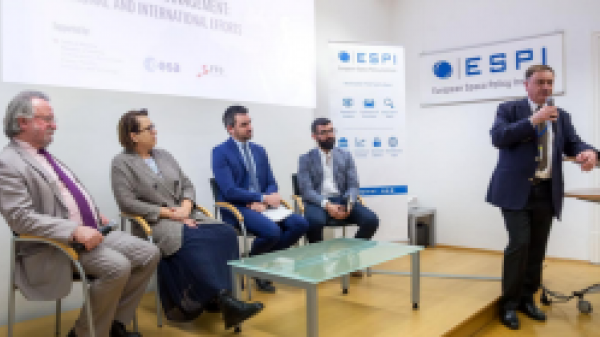This evening event seeks to shed light and spark open discussions on the topic of a possible future space traffic management framework, and to present diverse views on why it is becoming increasingly important to devise a new approach to space traffic, adapted to future activities in outer space.
The intensification of space activities worldwide is raising new challenges for the safety, security and sustainability of space activities. There are many new actors, including new space-faring nations and companies, as well as new applications like mega-constellations, cube-sats and on‐orbit satellite servicing. While the benefits of space services are being more widely enjoyed, the widespread increase of actors also raises the risk that national activities and interests will one day clash, potentially destabilising the near-Earth orbital environment. Among the possible policy options to address this challenge is the development of a Space Traffic Management (STM) framework.
The topic of STM has been gaining considerable international attention since 2015, when it was agreed that STM should be a single agenda item in the annual deliberations of the UN COPUOS Legal Subcommittee. Throughout these deliberations, different views were expressed, including some that elements of STM are already in place, and that existing international space law already contains provisions that are of relevance. Indeed, some of the substantive elements of the Long-Term Sustainability Guidelines represent robust building blocks for a space traffic management structure (notably guidelines B.1 and B.2).
While these discussions continue, though, risks in space continue to rise. Several concrete examples emerged over the last year which demonstrated that there are still many outstanding issues related to traffic in space, including unauthorised close-proximity approaches and a near collision between ESA and SpaceX satellites. These challenges contain technical and policy aspects with implications for safety and security not only in outer space, but also on the ground. Some of these challenges could even have geopolitical implications for some of the major space-faring nations.
While the US is the only country to adopt a formal STM framework for its national activities, other space-faring nations have also embarked on a spectrum of activities related to STM, including the development of space traffic monitoring functions. Likewise, private actors are also calling out for the development of transparent, predictable rules in order to ensure the integrity of their operations and investments. By bringing together actors from across diverse space communities, including governments, industry and academia, ESPI and UNIDIR seek to further international dialogue on what a possible space traffic management framework might look like and how it can be implemented.
